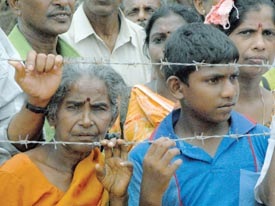 The Canadian Tamil Congress (CTC) is a national organisation that has been actively serving Canada’s Tamil community since October 2000. As the unified voice of Canada’s Tamils, the CTC has avidly worked to integrate various community service organisations and individuals from coast to coast in an effort to better represent and serve its nationwide community.
The Canadian Tamil Congress (CTC) is a national organisation that has been actively serving Canada’s Tamil community since October 2000. As the unified voice of Canada’s Tamils, the CTC has avidly worked to integrate various community service organisations and individuals from coast to coast in an effort to better represent and serve its nationwide community.
The Congress’s main function is to systematise Tamil-Canadian concerns and act as the community’s spokesperson on a municipal, provincial, federal and international level. The CTC boasts of local chapters in Ontario, Quebec and British Columbia as well as a National Capital Region chapter in the city of Ottawa.
Excerpts of an interview with National Spokesperson for the Canadian Tamil Congress, David Poopalapillai.
Q: Do Tamils still feel like second class citizens?
A: Yes, absolutely. Presently, Sri Lanka has more than 300,000 Tamils languishing behind barbed wire internment camps with bare necessities. Families have been separated and prevented at least, from meeting their relatives and easily obtaining help. International media has also been restricted. Aid organisations and groups, with the resources and infrastructure to help, have limited access. All these measures lead Tamils to feel like the population is being subjected to a collective punishment.
Secondly, the climate of fear is very high among Tamils in Sri Lanka as they do not feel they are safe or secure in any part of the country. Traditional Hindu festivals are stopped even in the hill country, where the war had a zero presence. On top of this, elected Tamil officials in the north and east are being successfully prevented from meeting the people who elected them to address their grievances and find remedies. These elected officials have no voice whatsoever in any decisions being taken or implemented in the north and east for a very long time.
While the displaced Tamil people have been housed in the camps for the last 25 years in many parts of the north and east, any displacement that has taken place among the majority community has been addressed immediately and they were settled with government assistance and led to lead their normal lives within a reasonable time.
There are many other examples I can mention but due to the time constraints, I am cutting it short. All these examples clearly show that Tamils not only feel like second class citizens but they are being treated as second-class citizens.
Q: What do you feel needs to be done in order for Tamils to feel like Sri Lankans?
A: Sri Lanka has to address the root causes and all the points listed above and give Tamils a sense of belonging. More importantly, Tamils should be allowed to have a political voice to address their concerns. They should feel their political voice is part and parcel of the collective political decision making process.
Q: Do Tamils still believe that a separate state is the only viable solution? Or is the dream of an independent Eelam now dead?
A: At this point of time, the Sri Lankan government’s actions are strengthening the thirst for an independent homeland for Tamils in the island of Sri Lanka. There is no inclusive approach from the leadership or any established political parties in Sri Lanka. The beauty of democracy lies in how well the majority treats its minorities, the saying goes.
Unfortunately, it is a distant dream in Sri Lankan politics. Until this dream becomes true, the thirst for an independent homeland for Tamils is going to stay well and alive.
Q: Are Tamils willing to accept federalism?
A: Tamils always believed in federalism in Sri Lanka. I want to take this opportunity to point out to you that it is the short-sighted chauvinistic policies of the successive Sri Lankan governments and the majority political parties in the country for their own electoral benefits that pushed Tamils to ask for independence. If a high form of federalism, such as the Canadian or Swiss model, are put forward, we are quite sure Tamils are willing to seriously look at it.
Q: Are they ready to consider themselves Sri Lankans and reconcile themselves with the modern Sri Lankan state?
A: The level of violence perpetrated by the government apparatus on ordinary Tamils is quite high in the last few decades. The levels of impunity these perpetrators enjoyed and are presently enjoying are beyond belief. Until these perpetrators are identified and brought to justice, reconciliation is difficult.
Q: What do they feel is the best way to take their struggle forward? And is violence still an option?
A: For the international Tamil diaspora, violence is not an option. By holding hands with progressive and political forces and governments around the world, isolating Sri Lanka politically and economically is the way forward. I want to remind you that in the past, many more powerful nations than Sri Lanka were isolated in this way and finally relented from their destructive policies and poor governance. Those governments addressed the grievances and root causes that created strife in their nations and are now flourishing.
(For updates you can share with your friends, follow TNN on Facebook and Twitter )
